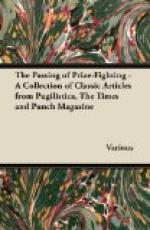Among other methods of brightening village life the Ministry of Agriculture has lately circulated “rules for the mutual insurance of pigs and cows.” The intellectual development of our domestic animals evidently proceeds apace. We have all heard of the learned pig, but that the cow also should be deemed capable of conducting actuarial calculations does, I confess, surprise me.
[Illustration: “WHO WAS CHIEF MOURNER?”
“I,” SAID THE WREN,
“I, WEDGWOOD BENN,
I WAS CHIEF MOURNER.” ]
Having heard the latest feat of the Sinn Feiners in kidnapping a British General, the House evidently considered that it had better hurry up with the Government of Ireland Bill. Clauses 51 to 69 were run through in double-quick time. Only on Clause 70, providing for the repeal of the Home Rule Act of 1914, did any prolonged debate arise. Captain WEDGWOOD BENN pleasantly described this as the only clause in the Bill that was not nonsense, and therefore moved its omission. He was answered by the PRIME MINISTER, who declared that no Irishman would now be content with the Act of 1914, and defended the present Bill on the curious ground that it gave Ireland as much self-government as Scotland had ever asked for. Sir EDWARD CARSON’S plea that it was a case of “this Bill or an Irish Republic” was probably more convincing. In a series of divisions the “Wee Frees” never mustered more than seventeen votes. The author of the Act of 1914, Mr. ASQUITH, was not present at the obsequies.
Tuesday, June 29th.—The establishment of a “National home” for the Jewish race in Palestine aroused the apprehensions of Lord SYDENHAM and other Peers, who feared that the Moslem inhabitants would be exploited by the Zionists, and would endeavour to re-establish Turkish rule. Lord CURZON did his best to remove these impressions. Authority in Palestine would be exercised by Great Britain as the Mandatory Power, and the Zionists would not be masters in their “national home,” but only a sort of “paying guests.” The confidence felt in Sir HERBERT SAMUEL’S absolute impartiality as between Jews and Arabs was such that a high authority had prophesied that within six months the High Commissioner would be equally unpopular with both races.
In the Commons Mr. BALDWIN explained that the Inland Revenue Authorities were taking all possible steps to collect income-tax in Ireland despite the obstacles placed in their way by the local authorities. Whereupon Sir MAURICE DOCKRELL, in his richest brogue, summarised the Irish situation as follows: “Is not the difficulty that they do not know which horse to back?”
A Bill “to continue temporarily the office of Food Controller” was read a first time. The House would, I think, be sorry to part with Mr. MCCURDY, whose replies to Questions are often much to the point. He was asked this afternoon, for example, to give the salaries of three of his officials, and this was his crisp reply: “The Director of Vegetable Supplies serves the Ministry without remuneration; the post of Deputy-Director of Vegetable Supplies does not exist, and that of Director of Fish Supplies has lapsed.”




